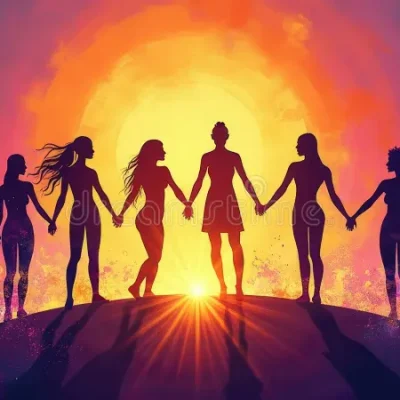Appreciation or appropriation? Exploring cultural sensitivity and the need for understanding
This article may be sensitive to many people, but I want to speak up as an individual who feels about specific cultures.
What is the boundary between appreciation versus appropriation? Are cultures flattering? How did adopting being viewed with disrespect? Or is America being so sensitive over everything?
I was borns in a country that lacks foreigners back in the day. No one understands what an in-person White, Hispanic, or Black person looked like because Vietnam was not popular by then. Over time, the population has been growing so much that being a foreigner is normal to us. My Vietnamese loves foreigners because they are appreciating our cultures which is why they visited our country in the first place. Seeing foreigners speaking little Vietnamese made people there feel pleased because we know that they just want to appreciate our culture by learning even if it’s bad. It’s like seeing a baby making their first walk or speaking the first word. We love seeing foreigners enjoying the cuisine. Loves seeing them driving motorbikes. Loves seeing them sitting by the crosswalk because that’s a part of our culture. But one thing that we also love is seeing foreigners see our Vietnamese traditional dress aka Ao Dai. Seeing them loving our culture made our Vietnamese always welcoming and we would just our best to make foreigners looks at Vietnam as their comfort place.
Of course, not 100% of foreigners would appreciate but on the other hand, they would appropriate our culture. Some would just be there to see what Vietnam looks like, some even making fun of or being disgusted by our culture.
I hate seeing my traditional Vietnamese dress being dressed inappropriately. Because if you research it, it is a dress that mostly covered any part of your body, yet over time, our culture adapt to more fashionable and comfortable so we changed certain aspects such as making a long dress into a knee-length dress, or a long sleeve dress into a shorter dress but either way, we still manage to wear it with something that would cover the legs. This is because most of our Ao Dai have a cut along the two sides of the dress so having a pant on is something that see as mandatory in our culture. Yet, some Vietnamese in America still wear it without having pants on which is a part of the reason why foreigners adopted that and pass along.
I asked an employee at Starbucks, Talanie, about cultural appropriation. She is an African-American, who has been growing up in the US.
I asked what do you think about me having cornrows?
“I feel like if you like it then wear it, even if people hate you for wearing it because I know that the only reason why you decided in the first place was that you like the hairstyle.”
I am further curious, why do you think people get offended by others wearing their culture’s hairstyle?
“I feel like there have been instances where people from non-African backgrounds have adopted African hairstyles, such as braids, without acknowledging or appreciating the cultural significance. This can be seen as disrespectful and dismissive of the historical and cultural context in which those hairstyles originated”
Talanie further added, “Most people get offended mainly because why when others wearing cornrows get compliment but whenever African wears it, they get discriminated by it. Many people didn’t get a job over their culture hairstyle which spark the hatred.”
After having a brief conversation with her, I think over many things. I understand the African-American perspective of why they get discriminated against while others get compliments over a hairstyle that originated in Africa.
It’s hard to speak for black people because I’m an Asian girl. But the common thing that we face is discrimination and hatred. And of course, I do not want to speak for everyone but rather than I’m speaking from my perspective after years of seeing people get hate over appreciating other cultures.
What I am seeing within American culture is the fact that people get offended a lot because if you go around the world, cultural appropriation were not such a big thing like that. I have never seen white women wearing a traditional dress and get attacked in other countries but in the US, it would be such a problem. But then you have ever asked, why are they wearing it and having it on their body? If they are mocking or being appropriate would they put it on or have it on in the first place? If they were simple, verbal words would already do the job but they spend money to receive it, would a hater be doing that?
I just don’t get why certain things can be passed on but other certain things can’t. Why is there a limit when it comes to adapting and appreciating? The suit originated in Britain. But now everyone is wearing it. Did they ever research where and the process of making a suit? NO!
Racism and discrimination are something that happening in the US, and we are not seeing any stopping signs. If the people can’t do such a thing then lets other factor carries. Music is what brought so many people around the world together. For example, KPOP was not a thing in the world but now it’s everywhere. And music makes a connection among those that enjoy it. So why can’t culture be a thing that can change the world into a better place?
I want to see more cultures intertwined, I want to see more people know more about other culture’s dress, cuisine, languages, and so on. And the only way of doing so is by getting less sensitive/offended and being more supportive.
If you see your culture is being used as a joke then call them out. If you see someone claiming your culture while they do not then call them out. The only people that shouldn’t be called out are those that enjoy and appreciate someone else’s culture.
Let the barrier between appropriation and appreciation be there, but do not claim everything to be appropriation when different cultures are the gift that god brought to each place around the world and was meant to be given out and shared out not kept within.






